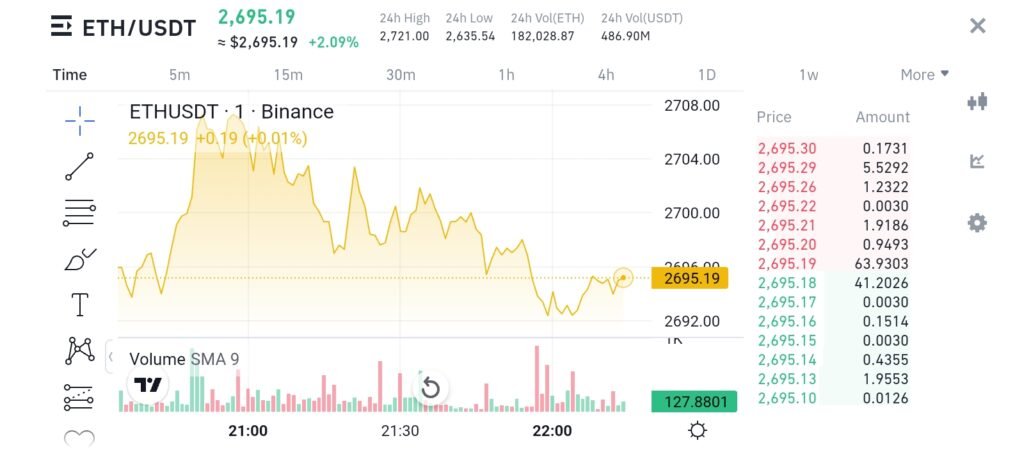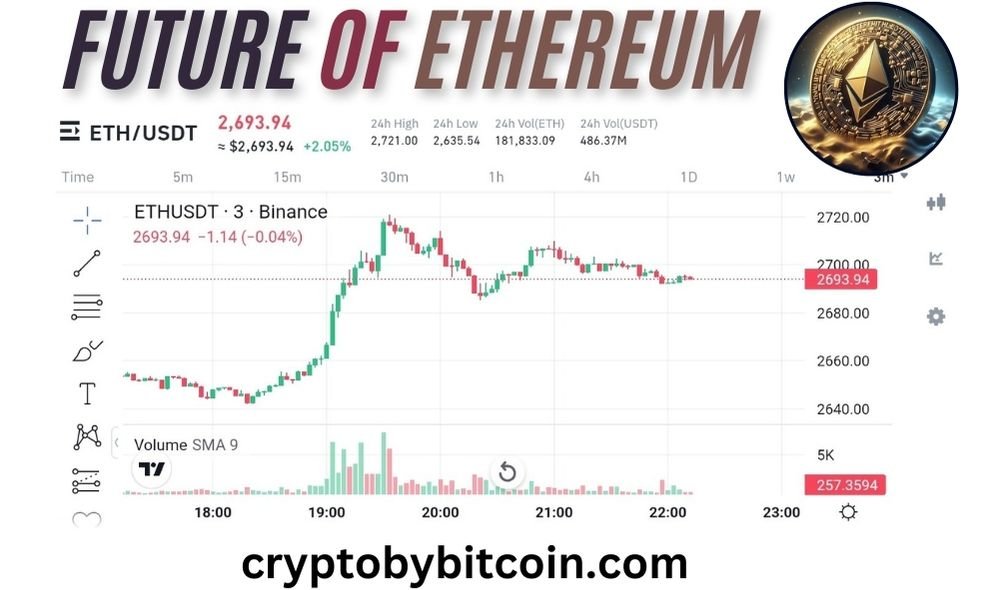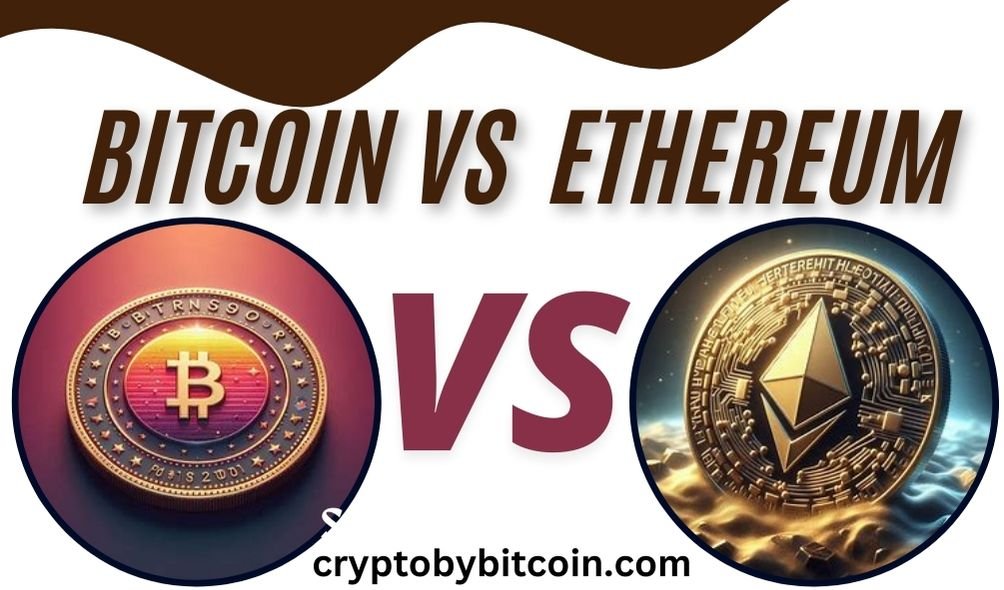Bitcoin vs Ethereum: Differences and future predictions
Among the highly fluid cryptocurrency, two names stand tall: Bitcoin and Ethereum. These two have made massive waves in popularity and market capitalization, at the helm of decentralized finance. Although both are based on blockchain technology, there is a difference with regards to purpose, functionality, and future potential. The article shall dig deep into the differences that surround Bitcoin and Ethereum, their use cases, future predictions, and frequently asked questions.
What is bitcoin?
Bitcoin is a form of cryptocurrency that came into being in the year 2009 by an anonymous entity, person, or persons with the pseudonym Satoshi Nakamoto. It has often been described as digital gold. Created as a peer-to-peer electronic cash system, it allows users to make and receive payments without intermediaries, such as banks and governments.
The main purpose of Bitcoin, however, is that it should be used as a store of value and means of exchange, a substitute for traditional fiat currencies. Because of the fixed supply of 21 million coins, Bitcoin’s scarcity has contributed to its increasing value over time.
What is ethereum?
Launched in 2015, Ethereum is much more than just a cryptocurrency; it was founded by Vitalik Buterin. Ethereum is a blockchain platform meant for developers to create decentralized applications, also known as dApps, facilitated by self-executing contracts-the terms of which are directly written into lines of code.
Although Ethereum does have its own cryptocurrency, Ether, which basically fuels all transactions on the network, Ethereum is very much focused on its blockchain rather than on the money itself. For this reason, Ethereum has become the favorite destination for projects that do involve the use of DeFi applications, namely, non-fungible tokens or other second-generation ideas.
Key differences between bitcoin vs ethereum
While bitcoin and ethereum are both using blockchain technology, they have very different focuses and purposes. A selection of the major differences between these two cryptocurrencies are listed below.
1. Purpose and Use Cases
Bitcoin: Considering the fact that Bitcoin was created primarily to replace traditional money, the primary use case of it remains storing value and mediation of exchange. Due to a limited supply, combined with the nature of Bitcoin preserving wealth, many referred to it as “digital gold.”
Ethereum: on the other hand, was designed to support decentralized applications and smart contracts. Ethereum supports a range of platforms on top of their blockchain, such as DeFi systems, gaming applications, or even NFT marketplaces. Ethereum is more about fostering innovation within the blockchain space than it is a mere digital currency.
2. Blockchain and protocol differences
The Bitcoin blockchain relies on a consensus algorithm known as Proof of Work, under which transactions are validated. It depends on miners to solve complex mathematical puzzles, a procedure that consumes a lot of energy. Blocks in the Bitcoin network are created at a rate of about one in every 10 minutes.
Ethereum Blockchain: Ethereum previously had relied on Proof of Work and recently partially moved to Proof of Stake with Ethereum 2.0. This new mechanism is more energy-efficient in that the miners are replaced by validators that should lock up ETH to propose new blocks. The Ethereum blockchain can boast of faster block times, creating blocks about every 12-14 seconds, making it fit for fast-moving applications.
3. Transaction Speed and Fees
Bitcoin: Bitcoin is a bit slower than Ethereum because of its block time. An average transaction in Bitcoin requires 10 minutes, though this in most cases increases with more traffic in its network. The fees charged on the Bitcoin network vary according to the state of the network at hand and is generally lower during peak hours compared to Ethereum.
Ethereum: Ethereum has faster block times compared to Bitcoin, which allows Ethereum transactions to be confirmed at a rate of about one minute. The transaction fees, or gas fees, on the Ethereum blockchain are quite high when demand is hot. It had been one of the popular discussions regarding Ethereum’s gas fees; because of this, layer-2 solutions have arisen to lighten up the high costs and provide better speed.
4. Supply and Issue
Bitcoin: There are only 21 million supplies of the cryptocurrency in existence, and these give rise to a deeper-lying scarcity. The supply is slowly released to the network via an analog process labeled “halving,” in which the reward for mining new Bitcoin diminishes by half every four years. This limited supply gives Bitcoin a big boost in its value proposition as a deflationary asset.
Ethereum: The supply of Ethereum is not capped, as it is in Bitcoin. It has more flexible monetary policy and is subject to change by governance proposals. While Ethereum has no hard cap, the transition to Proof of Stake and the introduction of EIP-1559-a proposal intended to burn part of the transaction fees-make for a more deflationary function of supply.
5. Smart Contracts and Apps
Bitcoin: Bitcoin does not natively support smart contracts. Basic functionality is achievable with the addition of second-layer technologies, such as the Lightning Network; however, the Bitcoin Scripting language is low-level and not Turing-complete, thus cannot be utilized for advanced use cases.
Ethereum: The smart contract functionality of Ethereum means it hosts automated types of agreements that could execute themselves in the absence of a central authority. In this regard, these smart contracts power an enormous ecosystem of dApps, ranging from DEXs to lending platforms. It is this programmability that seriously distinguishes Ethereum from Bitcoin and makes Ethereum the leading platform for blockchain innovation.
6. Governance and Development
Governance and Development Bitcoin: In Bitcoin, the development is strictly conservative and time-consuming. The primary focus here is on safety and decentralization. Any change applied to the network goes through the procedure of strict governance to ensure that the modification will upgrade the integrity of the system.
Ethereum: On Ethereum, development is quicker and community-driven. The founder, Vitalik Buterin, along with other core developers, actively proposes upgrades, such as transferring Ethereum to Ethereum 2.0. Consequently, in Ethereum, the mode of governance is more dynamic; the community can propose and vote on changes.
Prediction of bitcoin and ethereum in Future
Future of bitcoin
the future of bitcoin is still the leading cryptocurrency by market capitalization and is often considered a safe haven in crypto space. Nevertheless, several factors may contribute to Bitcoin’s future:
- Institutional Adoption: More and more institutions are hedging against inflation and storing value through the inclusion of Bitcoin in their portfolios. Companies like Tesla, MicroStrategy, and Square include Bitcoin in their balance sheet reserves. This increase in institutional adoption has been, and will likely continue driving up demand-enough to drive up the price of Bitcoin.
- Legal and Regulatory Landscape: As the governments of different countries continue to provide clarification in the regulatory frameworks concerning cryptocurrencies, the legitimacy of Bitcoin will increase. Still, on the other hand, it runs the risk of not being able to grow on account of overly restrictive regulations. Regulation continues to be a wildcard for now.
- Technological Innovations: Mappings around second-layer solutions, like the Lightning Network, shall proceed apace and further render Bitcoin faster and more scalable, which in turn could see its adoption as a medium of exchange for everyday use.
- Price Prediction: A number of experts have argued that Bitcoin may reach 100,000 dollars or more in only a few years if the inflation scare is not nursed back to health and Bitcoin continues to be seen as “digital gold.
Future of ethereum
Ethereum’s future is equally bright, though for different reasons:
- Ethereum: The upgrade of Proof of Stake with Ethereum 2.0 is going to mean much more than an important milestone per se. It would dramatically increase the scalability, security, and sustainability of the whole network and as such make it much more efficient and appealing for a wide audience of both developers and users.
- DeFi and NFTs: Ethereum is something of a backbone for the construction of the very fast-growing DeFi and NFT markets. As these markets expand, so does the relative importance of Ethereum. The proliferation of decentralized applications will apparently clearly entrench Ethereum as the central platform of blockchain innovation.
- Competing blockchains: Ethereum is still the dominant platform, though the competitor pool continues to rise. Solana and Binance Smart Chain are some of the new entrants in the already crowded field. But the network effect and huge community of developers supporting Ethereum give it a significant competitive advantage.
- Price prediction: Analysts are very confident about the propensity of Ethereum’s price to appreciate, with a variety of predictions running as high as $10,000 in the coming
Frequently Asked Questions (FAQs)
1. Which is better bitcoin or ethereum?
Both bitcoin and ethereum offer unique advantages. Bitcoin is ideal for storing value, often seen as “digital gold,” while Ethereum excels in enabling smart contracts and decentralized applications (dApps). The right choice depends on your investment goals—whether you’re looking for a long-term store of value or interested in blockchain innovation.
2. Can bitcoin and ethereum coexist?
Yes, they can. Bitcoin and Ethereum serve different functions, so there’s no conflict. Bitcoin is compared to gold as a store of value, while Ethereum operates like a technology platform, similar to Apple or Google. Many investors hold both to diversify their crypto portfolio.
3. Is Ethereum more scalable than Bitcoin?
Yes, Ethereum has more scalability due to faster block times and its continuous upgrades, particularly with Ethereum 2.0. Bitcoin’s simpler design focuses more on security, but this limits its scalability in comparison.
4. Can Ethereum surpass Bitcoin in market capitalization?
The idea of Ethereum overtaking Bitcoin in market value is often called the “flippening.” While Ethereum has a lot of potential due to its wide range of uses, Bitcoin’s status as the first and most famous cryptocurrency makes this tough. Still, Ethereum’s ongoing development and its role in decentralized applications (dApps), decentralized finance (DeFi), and non-fungible tokens (NFTs) are driving its growth. Even though Ethereum might not surpass Bitcoin in the near future, it could significantly close the gap as it becomes more central to blockchain technology.
5. What are the environmental Impacts of bitcoin and ethereum?
Bitcoin’s consensus mechanism, Proof of Work (PoW), requires a lot of energy due to the extensive mining operations, which has led to criticism about its environmental effects. On the other hand, Ethereum is transitioning to Proof of Stake (PoS) with Ethereum 2.0, which is much more energy-efficient. This switch will greatly reduce Ethereum’s energy consumption, making it far more eco-friendly compared to Bitcoin.
6. Which cryptocurrency is more decentralized Bitcoin or Ethereum?
Both Bitcoin and Ethereum aim to be decentralized, but they go about it in different ways. Bitcoin is often seen as the most decentralized cryptocurrency because of its broad adoption and secure, but slow development. In contrast, Ethereum evolves much faster, with a dedicated core team and an active developer community regularly releasing updates. While Ethereum is decentralized, Bitcoin’s simpler structure and slower pace make it arguably more resistant to centralization over time.
7. Can Bitcoin be used for smart contracts like Ethereum?
Bitcoin wasn’t originally designed for smart contracts, but it can support some through second-layer solutions like the Lightning Network. However, Bitcoin’s scripting language, Script, isn’t as flexible as Ethereum’s, which limits its capabilities. Ethereum, by contrast, is built with smart contracts in mind and is the clear leader in this space, offering more complex programming and application development options.
The Future of bitcoin and ethereum: What’s Next?
Both Bitcoin and Ethereum will likely continue to shape the future of cryptocurrency and blockchain technology.
Bitcoin’s future outlook
Bitcoin’s role as a store of value looks solid, especially with increasing institutional interest. As more financial organizations start viewing Bitcoin as a legitimate asset, its reputation as “digital gold” will likely grow. The development of layer-2 scaling solutions, like the Lightning Network, could help make Bitcoin more practical for everyday transactions, though its primary use remains as a store of value.
Many analysts believe Bitcoin’s price will keep rising, driven by global inflation concerns. Some forecasts even suggest Bitcoin could reach $500,000 in the long run, although this depends on factors like regulation, adoption, and competition from other cryptocurrencies.
Ethereum’s future outlook
Ethereum’s future is more dynamic because it supports decentralized applications and smart contracts. The completion of Ethereum 2.0 should address current issues like scalability and high transaction fees, making it more competitive with newer blockchains like Solana, Avalanche, and Cardano.
As the DeFi and NFT markets continue to grow, Ethereum stands to benefit greatly. Developers are likely to stick with Ethereum’s well-established infrastructure and large community, which could lead to Ethereum’s market capitalization catching up with or even surpassing Bitcoin’s in what’s called the “flippening.” While this is speculative, it highlights Ethereum’s importance as more than just a cryptocurrency. it’s a platform for blockchain innovation.
Key considerations for investors
If you’re thinking about investing, it’s crucial to understand the key differences between Bitcoin and Ethereum:
- Investment Goals: If you’re looking to preserve wealth or hedge against inflation, Bitcoin might be a better fit due to its fixed supply and status as a store of value. If you’re more interested in blockchain innovation, decentralized applications, or earning returns through staking, Ethereum offers more options.
- Risk Tolerance: Bitcoin’s stability and limited supply make it a safer, lower-risk option. Ethereum, on the other hand, comes with higher potential rewards but also higher risks, as it depends on ongoing technological developments and faces stiff competition.
- Diversification: Many investors choose to hold both Bitcoin and Ethereum because they tend to perform differently under various market conditions. Their unique use cases can complement each other in a balanced portfolio.
- Regulatory Impact: Government regulations will play a big role in the future of both cryptocurrencies. Bitcoin, as the more established asset, may have an easier time navigating this, while Ethereum’s complex ecosystem could face more regulatory challenges.
Conclusion
Bitcoin vs Ethereum are the pillars of the cryptocurrency world, each catering to different needs. Bitcoin, with its limited supply and strong institutional acceptance, is becoming digital gold, despite its slower transaction speeds and limited functionality. Its unmatched security and decentralization compensate for these drawbacks.
On the other hand, Ethereum is the go-to platform for decentralized applications like smart contracts, DeFi, and NFTs. Its shift to Proof of Stake (PoS) with Ethereum 2.0 will resolve issues like scalability and high fees, solidifying its role in the blockchain space.
In the years ahead, Bitcoin will likely maintain its dominance as a store of value, while Ethereum’s utility and market share could grow rapidly due to the increasing demand for decentralized applications. For both investors and enthusiasts, understanding the differences between Bitcoin and Ethereum is crucial for making informed decisions as the cryptocurrency space evolves.
While Bitcoin serves as a hedge against traditional financial systems, Ethereum leads blockchain innovation, making both key players in the future of global finance.






